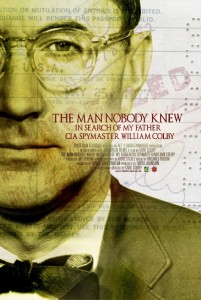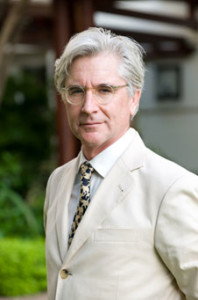Interview with Carl Colby, director of The Man Nobody Knew
Award-winning filmmaker Carl Colby’s latest documentary, The Man Nobody Knew: In Search of My Father, CIA Spymaster William Colby, is a personal quest to understand who his father really was. I interviewed Carl via telephone on Wednesday, December 7, 2011. He was gracious with his time and spoke openly and candidly about the film and his father. What follows is an edited version of our conversation.
____________________________________________________________
CinemaNerdz: As a veteran documentarian and the son of a famous career spy and CIA director, had you always wanted to make a film about your father, or was this something somebody had to convince you to do?
CARL COLBY: I had always thought about doing something, but I really didn’t know exactly what. During the period that he was alive I was making documentaries, but I was always a little reticent to do anything with him. If I asked him something very personal, like “Why did you divorce my mother?” he would just glaze over and go opaque on me and say, “That’s your department friend.” After he died [in 1996], I was watching Wolf Blitzer’s coverage of the fall of the Twin Towers and he was asking James Baker how this happened, and Baker said, “I trace this back directly to when William Colby was CIA Director and he revealed the CIA’s ‘Family Jewels,’” which decimated America’s ability to conduct covert action and clandestine activities. So I thought, God, my dad’s relevant.
CinemaNerdz: Were there times during the making of the documentary when you struggled with the father-son approach and how to best present it?
COLBY: There was a lot of exposition to lay out. I never felt that I could go more than 45 seconds into any of the history without relating it to him. I had to go deep into the personal because that’s the only way you can even attempt to understand the man.
CinemaNerdz: Your dad liked to say that spying was a dirty business, yet he basically devoted his entire life to it. Can you talk a little about that?
COLBY: The American public looks at spying through the prism of James Bond – cool, sexy, beautiful girls, bad guys, and fancy weaponry. The truth is that there are very few, if any, “James Bonds.” A spy in Syria now or Tehran is going to be a Syrian or an Iranian, and they have to completely blend in. My father never romanticized it. Occasionally he would lay out a little smile about what he was up to and that it was exciting, but there was a lot of evil that he was combating. There was a lot of death, injury, dashed hopes, and bleak results for a lot of the things that he and his compatriots were engaged in.
CinemaNerdz: You say several things that reveal the coldness and secretive nature of William as a father and husband. He had no friends and was only relaxed around people he worked with. You’re not even sure he ever loved anybody. Having said that, do you think your father was a happy man?
COLBY: I think he was very happy to be on the job. From 1950 to 1976 he was very engaged and locked on. He was in the moment, and I think we took a secondary role. You always knew that the job took precedence. He would just disappear for a week or two. Frankly, we always thought he was tasked with something special. We felt that we were supporting him and that it was good work.

The theatrical poster for Carl Colby’s “The Man Nobody Knew.”
CinemaNerdz: I think your mother Barbara is the most interesting interviewee in the film. They divorced in 1984, but it almost seems as if she’s still coming to terms with the fact that maybe she really didn’t know much about William Colby after all. Do you think your film’s title, The Man Nobody Knew, applies to Barbara as well?
COLBY: Yeah. I would say you’re right. How many Bill Colby’s are there, and who is he really? Who’s he loyal to? He’s loyal to his country, but is he loyal to us? I’m not sure. I think my mother’s still coming to terms with him because if he betrays you in the end then who was he really and what was this all about? Were we just a cover? It’s a very disconcerting thing to come to grips with.
CinemaNerdz: Did your mother agree to the interview right away, or did it take some coaxing?
COLBY: She wanted to be represented. She felt she had something to say. I didn’t know how much she had to say until she started saying it. I’ve always had a close rapport with her, so I think we immediately fell into a pact where we were on this quest together. We were asking soul-searching questions, and I think she was brave enough to ask those questions of herself.
CinemaNerdz: You devote a great deal of time to your father’s Vietnam experience. In regards to the Phoenix Program, here was William Colby, always a soldier at heart, implementing groundbreaking counterinsurgency ideas into the field. It worked in the beginning but somehow managed to spiral out of control in the areas of interrogation and assassinations by 1970-71. Your father came home from Vietnam in 1971 and four years later he was in front of the Church Committee talking about Phoenix and other secret CIA activities. Did your father have regrets about the Phoenix program, which was essentially his brainchild?

Director Carl Colby. ©2008 Carl Colby Films, LLC. All Rights Reserved.
COLBY: He had no regrets. Actually, he felt the program was very effective. A few years ago General Giap, who was head of all North Vietnamese forces during the entire war, said, “Phoenix hurt us. It was destroying the VC infrastructure.” From the ground perspective it was having a very brutal effect. The problem was that Americans were getting fed up by 1968-69 with the whole war, so no matter what shape Phoenix was taking – napalming, intense bombing, B-52 raids – the American people had just grown sick of it. I don’t think my father understood the social and political context of the war he was fighting.
CinemaNerdz: William revealed things about the CIA to the Church Committee that he didn’t necessarily have to reveal. The film gives us good insights as to why your dad did what he did during those hearings, but how did that period affect you as a young man?
COLBY: I felt I had to be the little boy in the beginning. I had to be the guy, 8-9 years old, who adores his dad, who sees him as a war hero. And then I find out he’s a spy. Well, that’s cool, too. By the time I’m a teenager and the Vietnam War cranks up, I’m seeing posters calling him a war criminal and a murderer, and I start having questions. I grow up through the course of the film. By the end, I’m a man making conclusive remarks about him.
CinemaNerdz: You interviewed over 85 people for the documentary. Was there anything you wanted to squeeze in but didn’t have space for?
COLBY: There were a couple of things, and I’ll be putting them together in a DVD. One of them is, “What is the spy tradecraft? How does it work?” The other is, “So, what’s going on now?” There are a few thousand “Bill Colbys” out there now who are engaged in exactly what he was doing. The real story is that every president uses covert action and you have to be careful because it’s a seductive, unchecked weapon that can get you into a world of trouble.
CinemaNerdz: Who was the most interesting interviewee outside of your mother and why?
COLBY: I was most intrigued with Brent Scowcroft. He was very forthright with me and wasn’t afraid to say what was on his mind. He felt like he could speak to me man-to-man. He called my father a tortured soul. I may not agree with him, but I have a lot of respect for him.
CinemaNerdz: Your father died in a boating accident in 1996. You don’t go into too much detail about the circumstances surrounding his death, but you do say that he’d had enough of this life. Is there anything else you’d like to add to that?
COLBY: A few months before he died I was talking to him and I said, “Hey, by the way, your old friend and college classmate was found under a bridge in Vermont. He has advanced Alzheimer’s.” My father said, “Oh, that’ll never happen to me.” And I said, “Oh, yeah?” And he said, “Yup. One day you’ll hear that I was walking on a goat path on a Greek island and I fell to the sea.” My father didn’t want the senior discount. He didn’t want the AARP card.
____________________________________________________________
See Carl Colby’s The Man Nobody Knew beginning December 16th, 2011!


